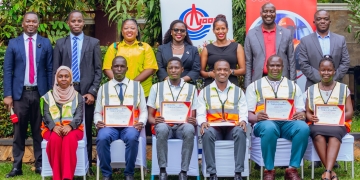
KAMPALA, UGANDA – Researchers from Makerere University’s Environment for Development Initiative (EfD-Mak) Centre have dispelled common misconceptions about oil and gas projects, dubbed “corridor talk,” during a recent field visit to the Albertine oil fields in western Uganda.
Dr. Madina Mwagale Guloba, Senior Research Fellow, noted that community members affected by oil projects appeared happier and saw more opportunities, contrary to popular beliefs. “Seeing is believing, and seeing also learning from a point of view is very critical,” she emphasized. “In the next 30 years, people would have gotten even more opportunities.”
Prof. Johnny Mugisha, Deputy Centre Director, highlighted the importance of firsthand observations and direct stakeholder engagement. “The objective of visiting the oil and gas sites and companies is to enable our research fellows familiarize with activities and operations in Uganda’s oil and gas with a view of fostering researchable projects, constructive dialogue and policy developments on critical issues related to sustainable development.”
Dr. Alex Tatwangire, Research Fellow and Lecturer, also emphasized the value of direct stakeholder interaction. “This engagement with stakeholders on the policy of energy utilization in Hoima has been incredibly useful. We’ve had the chance to observe the oil extraction process firsthand. Reading about it and hearing about it is one thing, but going on the ground and interacting with everyone involved provides a much richer understanding.”
The researchers also observed effective environmental mitigation plans and agricultural integration in restoring livelihoods for project-affected persons. “We saw how agriculture is integrated into livelihood restoration for project-affected persons, with strategies to strengthen these livelihoods through training, seeds, and advanced technologies,” Dr. Tatwangire remarked.
Prof. Mugisha also noted the interdependence of the petroleum sector and farming communities. “From interactions in Hoima, Bulisa, and with people in the oil sector, the lessons learned indicate that Makerere University has much more to contribute, especially in research, outreach, and grassroots stakeholder engagement.”
By shedding light on the actual experiences of project-affected persons, the EfD-Mak Centre aims to contribute to more informed decision-making and sustainable development in the oil and gas sector.










